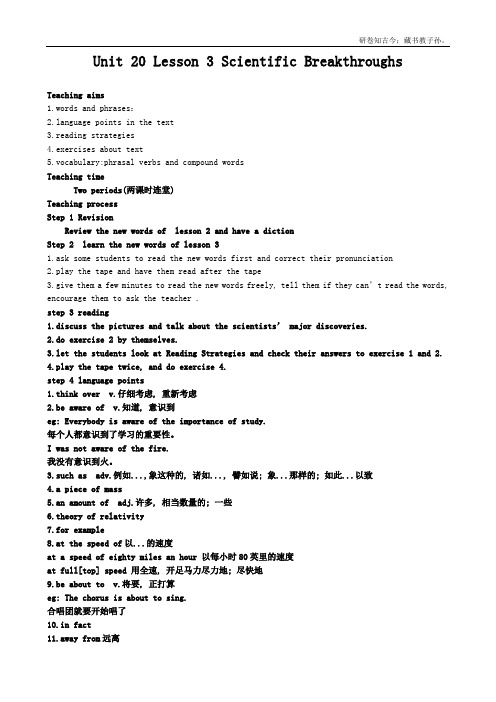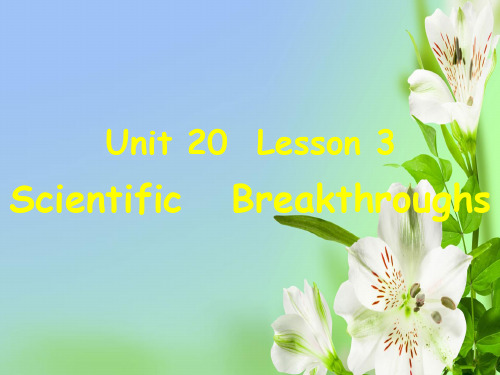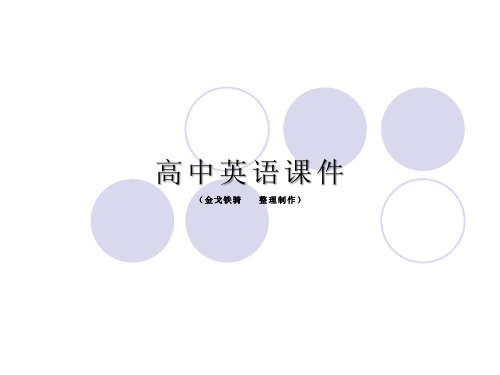北师大版模块7 Unit 20 Lesson 3
2020-202英语北师大版选修7课件:Unit20Lesson3 ScientificBreak

20世纪最重要的科学家之一是阿尔伯特·爱因斯坦。1905年的 夏天,这个直率的年轻人正在摇着他一岁大的孩子,突然灵感产 生了。“E=mc2”诞生了。E=mc2显示出质量很小的物质怎样能 产生出令人难以置信的巨大能量。之后爱因斯坦又在他的“相对 论”中表明,就连时间、质量和长度也不是持久不变的——它们 随着人们看待它们的角度不同而有所改变。
and weighed over 30 tonnes. With 18,000 tubes, thousands of
circuits and 6,000 switches, it used so much energy that when it was turned on, the lights in the local town went out!
1929年,又一个意义深远的发现诞生了,发现者是一个苏格 兰牧羊人家的孩子。去度假之前,生物学家亚历山大·弗莱明把一 个带有细菌的盘子放在了实验室里。回来后,他注意到不同寻常 的东西。他仔细检查了一下,发现盘子里有青色的霉斑,其周围 的细菌都被消灭了。原来这些青色的霉斑正是青霉素的自然形 态,弗莱明意识到青霉素是杀灭细菌的有效方法。
通讯随着移动电话的引入而改变,我们通信的方式从写信变 成发电子邮件。我们开始在世界各地飞行,同时,科学家们发现 怎样分离原子,而原子以前被认为是宇宙中最小的物质微粒。
Although it is impossible to choose the most important discovery, it is possible to single out a few pioneers of the 20th century. Here are five of them.
Unit 20 New Frontiers
北师大版高中英语选修7Unit 20 Lesson 3 Scientific Breakthroughs教案1 北师大版 选修7

Unit 20 Lesson 3 Scientific BreakthroughsTeaching aims1.words and phrases:nguage points in the text3.reading strategies4.exercises about text5.vocabulary:phrasal verbs and compound wordsTeaching timeTwo periods(两课时连堂)Teaching processStep 1 RevisionReview the new words of lesson 2 and have a dictionStep 2 learn the new words of lesson 31.ask some students to read the new words first and correct their pronunciation2.play the tape and have them read after the tape3.give them a few m inutes to read the new words freely, tell them if they can’t read the words, encourage them to ask the teacher .step 3 reading1.discuss the pictures and talk about the scientists’ major discoveries.2.do exercise 2 by themselves.3.let the students look at Reading Strategies and check their answers to exercise 1 and 2.4.play the tape twice, and do exercise 4.step 4 language points1.think over v.仔细考虑, 重新考虑2.be aware of v.知道, 意识到eg: Everybody is aware of the importance of study.每个人都意识到了学习的重要性。
北师大版高中英语选修7Unit 20 Lesson 3 Scientific Breakthroughs 课件 课件ppt

Theory of relativity
It showed time, mass and
length 4. change according
to our experience of them.
Reading Task:
Edwin Hubble
It proved that the universe
5.New galaxies like was vastly 6. larger than
4. Hubble studied the universe for over twenty years.
5. Hubble discovered that our galaxy is bigger than we thought it was.
6. Fleming had been studying bacteria in his laboratory when the discovery happened.
Alexander Fleming
Penicillin
It saved
7.
Eckert and Mauchly
The first computer
It was produced to increase the US Navy’s missiles.
8 of the
Percy Spencer
9.
It helps us prepare meals in minutes.
hospital when you die.
Are these statement true or false according to the text or is there no information?
北师大版模块7 Unit 20 Lesson 3 课件

mass-produce; double-check
6. Work in pairs. Discuss these questions with
your partner. 1.Which of the discoveries mentioned in the text has been the most important so far? Why? 2.In your opinion which discovery will have the most important consequences in the future? Why?
F
NI T
4. Hubble studied the universe for over twenty years.
NI T
5. Hubble discovered that our galaxy is bigger than we thought it was. 6. Fleming had been studying bacteria in his laboratory when the discovery happened. 7. There was a blue mould around the bacteria in the dish.
11. The scientist who discovered microwaves invented microwave ovens.
NI
12. Today it is possible to donate your heart to hospital when you die.
T
5. Match the categories (a-e) with the examples (1-5) . Then add examples of your own. compound adjective: one-year-old; world-famous; far-reaching compound noun (n. + n.) : CD player; jet engine
北师大高中英语选修七Unit20Lesson3《ScientificBreakthroughs》课件

Some Discoveries\ Significance pioneers Inventions
Albert Einstein
2. E=mc2 .
It showed how a small piece
of mass could produce an
unbelievable amount of
3. energy .
5. Hubble discovered that our galaxy is bigger than we thought it was. T
6. Fleming had been studying bacteria in his
laboratory when the discovery happened. F
It showed time, mass and length 4
.
according to our experience of them.
Edwin Hubble
5 like the
one we live in
It proved that the universe was vastly 6 . than had previously been thought.
Simple outline
introduction
Body
Some great pioneers of science and their inventions or discoveries
Conclusion
A brief introduction of scientific breakthroughs in the 20th century
Some pioneers Discoveries\ Inventions Significance
北师版选修7Unit 20 Period 3 Lesson 3 Scientific Breakthroughs

Period Three Lesson 3 Scientific BreakthroughsⅠ.单词自测1.procedure n.步骤;程序2.donate vt.捐赠;赠送3.correspond vi.通信;符合4.meanwhile adv.同时5.split vi.分离,分开6.premier adj.最重要的;n.总理7.outspoken adj.直言的,坦率的8.outcome n.后果,结果9.cure vt.治愈10.wrestle vi.努力解决;摔跤;搏斗11.patent n.专利Ⅱ.短语自测1.range_from...to...在某范围内变化2.replace...with...用……代替……3.figure_out计算出4.be_thought_to_be被认为是……5.turn_to_sb.向某人求助6.wrestle_with_sth.努力解决难以处理的事物7.be_dedicated_to献身于;专注于8.by_mistake错误地;由于差错9.be_grateful_for感谢……,对……心存感谢10.experiment_with试验……,试用……1.In the summer of 1905,this outspoken young man was_rocking his one-year-old baby when he was suddenly inspired.1905年的夏天,这位直率的年轻人正摇着他一岁大的孩子,这时他突然产生了灵感。
2.Einstein had already become world-famous when a young ex-lawyer,returning_from_the_First_World_War,started work in California.从一战中转战回来,曾经担任过律师的年轻人在加利福尼亚开始工作时,爱因斯坦已经举世闻名了。
北师大版第7模块第20单元第3课课文短语句型荟萃

北师大版第7模块第20单元第3课课文短语句型荟萃2014-4-121. PIONEERS OF SCIENCE科学先锋Paragraph 12. If you had to choose the single most important discovery of the 20th century, you would have a real dilemma on your hands.如果要选择20世纪最重要的发现,你将会面对一个真正的难题。
3. not to mention更不用提4. Medical advances ranged from discovering the causes of diseases under microscopes to surgical procedures replacing diseased organs with donated ones.医学的进步包括从在显微镜下发现疾病的起因到用捐赠器官替代病变器官这样的外科手术过程。
5. The way we correspond went from writing letters to emailing. 我们通信的方式从写信变成发电子邮件。
6. We started flying around the world and meanwhile, scientists figured out how to split the atom, previously thought to be the smallest particle of matter in the universe. 我们开始在世界各地飞行,同时,科学家们发现怎样分裂原子,而原子以前被认为是宇宙中最小的物质颗粒。
Paragraph 27. single out a few pioneers of the 20th century选出20世纪的一些科学先锋Paragraph 38. One of the 20th century's premier scientists was Albert Einstein. 20世纪最重要的科学家之一是阿尔伯特·爱因斯坦。
2020-202英语北师大版选修7:Unit20Lesson3 ScientificBreakth

课时作业9Lesson 3Scientific BreakthroughsⅠ.单词拼写1.He was in a________(困境) where he couldn't decide whether to accept or refuse the gift.2.You'd better________(捐赠) some food and money to the poor children.3.I often________(通信) with my old friends.4.Mr Green is watering flowers.________(与此同时),Mrs Green is cooking breakfast.5.The band________(分离) up in the 1970s.6.He is an________(坦率的) man.7.The________(薄雾) was floating over the mountain.8.The man was________(治愈) of his heart attack.9.He applied for a________(专利).10.The________(结果) of the election was announced yesterday.★答案★1.dilemma 2.donate 3.correspond 4.Meanwhile5.split 6.outspoken7.mist8.cured9.patent10.outcomeⅡ.用适当的介、副词填空1.The audience ranged from adults________children.2.Mr white corresponded________his wife once in a while.3.Have you figured________this problem?4.The tough man wrestled________the snowstorm.5.Her father was dedicated________finding a way out.6.He took away my basket________mistake.7.The excellent players were singled________to compete in the game.8.There is no doubt________his honesty and kindness.9.He is fond of participating ________the voluntary work.10.He based his opinion________facts.★答案★与解析1.to range from...to 从……到……范围变化。
- 1、下载文档前请自行甄别文档内容的完整性,平台不提供额外的编辑、内容补充、找答案等附加服务。
- 2、"仅部分预览"的文档,不可在线预览部分如存在完整性等问题,可反馈申请退款(可完整预览的文档不适用该条件!)。
- 3、如文档侵犯您的权益,请联系客服反馈,我们会尽快为您处理(人工客服工作时间:9:00-18:30)。
E=mc2 showed how a small piece of mass could produce unbelievable amount of energy.
Einstein then showed in his “theory of relativity” that not even time, mass or length are constant — they change according to our experience of them.
He discovered small areas of mist which were in fact galaxies like our own, millions of light years away from us, which proved that the universe was vastly larger than had previously been thought.
One of the 20th century's premier scientists was Albert Einstein. In the summer of 1905, this outspoken young man was rocking his one-year-old baby when he was suddenly inspired. “E=mc2” was born.
In 1929, another far-reaching finding was made by the son of a Scottish shepherd.
Before he went on holiday, biologist Alexander Fleming left a dish with bacteria in it in his laboratory. When he came back, he noticed something strange.
Communications changed with the introduction of mobile phones and the way we correspond went from writing letters to emailing.
We started flying around the world and meanwhile, scientists figured out how to split the atom, previously thought to be the smallest particle of matter in the universe.
It measured 100 feet long by over 10 feet high and weighed over 30 tonnes. With 18,000 tubes, thousands of circuits and 6,000 switches, it used so much energy that when it was turned on, the lights in the local town went out!
“Nature made penicillin,” he said, “I just found it.” During the Second World War, when Fleming's discovery was first helping to cure people, the US Navy was looking for ways of improving the accuracy of their missiles.
The navy turned to Eckert, an engineer, and Mauchly, a physicist, to wrestle with the problem and produce a machine to do the job.
Although they only finished after the war in 1946, it did not matter. This huge machine was the world's first computer, but it was nothing like our computers today.
Medical advances ranged from discovering the causes of diseases under microscopes to surgical procedures replacing diseased organs with donated ones.
There is no doubt about it. Without the breakthroughs of these pioneers in science and technology, whether lucky or planned, the world as we know it today would have been a completely different place.
For example, we are all grateful for the handy microwave oven that allows us to prepare meals in minutes and we have Percy Spencer to thank.
This inventor, with 120 patents to his name, discovered microwaves when he was experimenting with radars and noticed a chocolate melting in his pocket.
Einstein had already become world-famous when a young ex-lawyer, returning from the First World War, started work in California.
Using the most high-powered telescope of the time, he began the long, slow process of exploring our galaxy. Edwin Hubble was about to make astronomy's greatest breakthrough of the century.
A few years later, penicillin was being mass-produced and helping to save the lives of millions. Fleming remained modest about the amazing outcome of his discovery.
These pioneers of the 20th century were all dedicated to improving the quality of human life on earth, but sometimes breakthrough discoveries that have affected our lives today happened by mistake!
If you had to choose the single most important discovery of the 20th century, you would have a real dilemma on your hands.
In just 100 years, the world changed completely. Amazing discoveries were made in medicine, communications and transport, not to mention our knowledge of the world and space.
He double-checked and saw a blue mould in the dish around which t. This blue mould was in fact the natural form of penicillin, which Fleming realised could be used to kill bacteria.
Although it is impossible to choose the most important discovery, it is possible to single out a few pioneers of the 20th century. Here are five of them.
